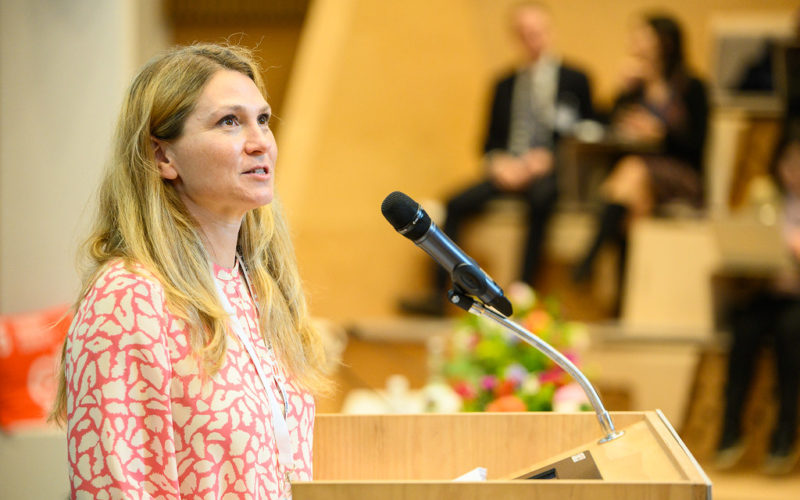The following is a statement from the International Transport Workers’ Federation (ITF):
A brave female cadet (anonymously known as Midshipman X) recently published the horrific experiences of sexual assault she endured on board a vessel while attending the U.S. Merchant Marine Academy (USMMA). The incident and response she details brings shame on the shipping industry and underlines the urgent need for action to eliminate violence in the workplace.
Eliminating violence in the workplace requires action from employers, employees and governments, since it is everyone’s responsibility to ensure the safety and security of seafarers, including women seafarers.
In her online post, the cadet revealed the full horror of the incident that occurred on board a Maersk Line vessel while she was serving her year at sea in 2019. Going public prompted an independent inquiry from A.P. Moller-Maersk, and investigations by the Maritime Administration (MarAd) of the U.S. Department of Transportation.
But we cannot leave it there.
Policies need action
“Sadly, this is not an isolated incident, but a reality for many seafarers, both male and female, regardless of flag or company,” said ITF Seafarers’ Section women’s representative Lena Dyring. “We know that women’s experiences in the shipping industry, ashore and at sea often do not match the best intentions laid out in policies. Although many women seafarer trainees have great support during their education ashore, including as part of mentoring programs.”
“It is an all-too-common an experience that too many women seafarers suffer from harassment and bullying. Too many encounter discrimination in the workplace, and in the worst cases, assault,” she said.

Dyring said everyone in maritime has a responsibility to change the male-dominated culture and remove obstacles and barriers faced by women in the industry. Dyring also revealed that following a recent publication of an ITF statement condemning an assault on a female ITF inspector, she received a letter from a woman seafarer that contained a strong message to the industry that is worth amplifying.
In the letter, the seafarer argues that “violence is NOT the only reason why the maritime industry cannot retain more women. The maritime industry is riddled with poor attitudes and perceptions toward employing/training women, cronyism, nepotism, lack of career progress – i.e., by not being considered capable of doing the job, being passed over (usually by a junior male), and lack of opportunities, employment options, career development, etc.”
As the ITF Seafarers’ Section women’s representative, Dyring agrees with the seafarer that attracting and retaining women to seafaring will require more than just dealing with perpetrators to remove negative behaviors.
“She is absolutely right that positive contribution of women at sea need to be celebrated and profiled. Together, we can make a career at sea safe. We can make it secure place for everyone, including women, so that all seafarers can progress and achieve their full potential,” Dyring said.
In 2020, women made up just 1.28 percent of the overall global seafaring workforce, and just 0.73 percent of officers. While the cruise and ferry sectors were the main employers of women seafarers, the pandemic has severely affected employment in the former, with many women seafarers who were working in cruise considering a return to sea via the cargo sector, where a female seafarer will typically be outnumbered 20-to-1 among an otherwise all-male crew.
Seafaring needs women. But women must be safe, respected and valued in seafaring.
Behavior, culture must be tackled to lift women seafarers
For many years the industry, supported by bodies such as the International Labour Organization (ILO), have worked to increase the number of women in the maritime industry, including in senior roles.
The intentions are good, but to make meaningful progress, there needs to be a shipboard environment that is inclusive of women. This requires awareness training of male seafarers with their active cooperation, establishment of formal support networks for women seafarers, and confidential avenues for seafarers to raise concerns that are promptly investigated and dealt with. Unacceptable behavior must be immediately addressed and stopped.
The ITF will soon be publishing its own support materials for women seafarers, and will be specifically including guidance on seafarers’ rights to safe, healthy and violence-free workplaces. The push is consistent with the ITF’s support for ratification of ILO Convention 190 by national governments. C190 makes clear all workers’ rights to freedom from gender-based violence and harassment in the world of work.
Step up and match her bravery with action: ITF to industry
To achieve an industry that promotes diversity and inclusion and welcomes equally seafarers of all genders, collaboration from everyone in the shipping sector is needed. We know that a more diverse workplace that makes use of all our talents is a stronger and healthier one.
The ITF global union family is thankful to this brave woman for coming forward to give her account of this terrible experience, as it makes this important issue more visible. The justifiable outrage her testimony has caused has the potential to move us toward a safer, more inclusive industry for the women and girls who are to follow her in pursuing a career at sea.
It is incumbent on all of us to honor this seafarers’ bravery with our action. The shipping industry must now step up and make the change happen – and real change needs real commitment. The ITF stand ready to play our part in whatever way we can.

